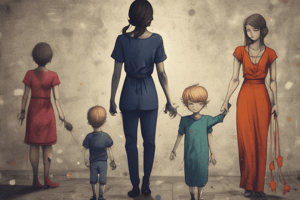Podcast
Questions and Answers
What is the obligation of hospitals towards pregnant women?
What is the obligation of hospitals towards pregnant women?
- To protect the unborn child by providing subsidies
- To ensure they receive adequate nutrition
- To provide free medical services to them
- To protect the child by performing examinations on the newborn (correct)
Up to what age can children live with their parents in prison?
Up to what age can children live with their parents in prison?
- Until they turn 21 years old
- Until they turn 12 years old
- Until they turn 18 years old
- Until they turn 6 years old (correct)
What can lead to the suspension of parental authority?
What can lead to the suspension of parental authority?
- Failure to provide for the child's needs (correct)
- Declaration of absence
- Loss of a parent's job
- Parent's frequent travel
What is a requirement for integrating a child into a foster home?
What is a requirement for integrating a child into a foster home?
What is the purpose of tutelage?
What is the purpose of tutelage?
Why can a child be removed from their parents' care?
Why can a child be removed from their parents' care?
What happens when a parent loses their authority?
What happens when a parent loses their authority?
What is the main goal of the Código Niño Niña Adolescente?
What is the main goal of the Código Niño Niña Adolescente?
What is the minimum age requirement for adopters?
What is the minimum age requirement for adopters?
What is considered as maltrato to a NNA?
What is considered as maltrato to a NNA?
What should institutions and professionals do when they know of a NNA being maltreated?
What should institutions and professionals do when they know of a NNA being maltreated?
What is prohibited in educational institutions?
What is prohibited in educational institutions?
What is the role of the state in the education of NNAs?
What is the role of the state in the education of NNAs?
What is not a requirement for adopters?
What is not a requirement for adopters?
Who is responsible for protecting NNAs from maltrato?
Who is responsible for protecting NNAs from maltrato?
What should happen to educational institutions that reject pregnant students?
What should happen to educational institutions that reject pregnant students?
What rights and obligations does the adopted person acquire through adoption?
What rights and obligations does the adopted person acquire through adoption?
What is the pre-adoptive period according to the Child and Adolescent Code?
What is the pre-adoptive period according to the Child and Adolescent Code?
How will the adopted person be registered in the civil registry and birth certificate?
How will the adopted person be registered in the civil registry and birth certificate?
Who can be adoptive parents according to the Child and Adolescent Code?
Who can be adoptive parents according to the Child and Adolescent Code?
What is the primary requirement for adoption?
What is the primary requirement for adoption?
What is the purpose of the pre-adoptive period?
What is the purpose of the pre-adoptive period?
What is the role of the judicial authority in the adoption process?
What is the role of the judicial authority in the adoption process?
What is the effect of adoption on the adoptee's family ties?
What is the effect of adoption on the adoptee's family ties?
What is the responsibility of those in charge of educational institutions?
What is the responsibility of those in charge of educational institutions?
What is the purpose of the education system?
What is the purpose of the education system?
What is the role of the child protection agency?
What is the role of the child protection agency?
What is the purpose of communicating with parents and the child protection agency?
What is the purpose of communicating with parents and the child protection agency?
What is the responsibility of schools regarding child welfare?
What is the responsibility of schools regarding child welfare?
What is the consequence of neglecting child welfare?
What is the consequence of neglecting child welfare?
What is the role of educational institutions in promoting child welfare?
What is the role of educational institutions in promoting child welfare?
Why is it important to communicate with parents and the child protection agency?
Why is it important to communicate with parents and the child protection agency?
Flashcards are hidden until you start studying
Study Notes
Obligations of Health Centers
- Health centers must perform examinations on newborns to diagnose and treat diseases adequately.
Children Living with Incarcerated Parents
- Children can live with their parents who are incarcerated until they reach the age of 6.
Suspension of Parental Authority
- Parental authority can be totally or partially suspended in cases of declared absence, unjustified lack of care, or neglect of duties.
Integration into a Substitute Home
- The decision to integrate a child into a substitute home must take into account the child's opinion, when possible, according to their age and maturity level.
- The integration process should prioritize keeping siblings together.
Guardianship
- Guardianship is the legal authority granted to a person over 18 years old to care for and protect a child when their parents have lost their authority or have passed away.
Adoption
- Adoption gives the adopted child the status of a biological child, with all rights and responsibilities.
- During the pre-adoption period, the child lives with the adoptive parents for a period determined by the judicial authority.
- After adoption, the child's birth certificate is updated to reflect their new status as a biological child of the adoptive parents.
Eligibility for Adoption
- Eligible adoptive parents must meet specific requirements, including being at least 25 years old, having no criminal record, and being at least 15 years older than the child.
Child Abuse
- A child is considered a victim of abuse if they suffer physical, psychological, or moral harm, except in cases of disciplinary or educational measures.
Obligations of Educational Institutions
- Educational institutions are prohibited from rejecting or expelling students who are married or pregnant.
- They must communicate with parents and the child protection agency in cases of repeated absences, desertion, or abuse.
State Obligations to Education
- The state is responsible for providing free education, including primary education, with materials, transportation, food, and medical assistance.
Studying That Suits You
Use AI to generate personalized quizzes and flashcards to suit your learning preferences.




